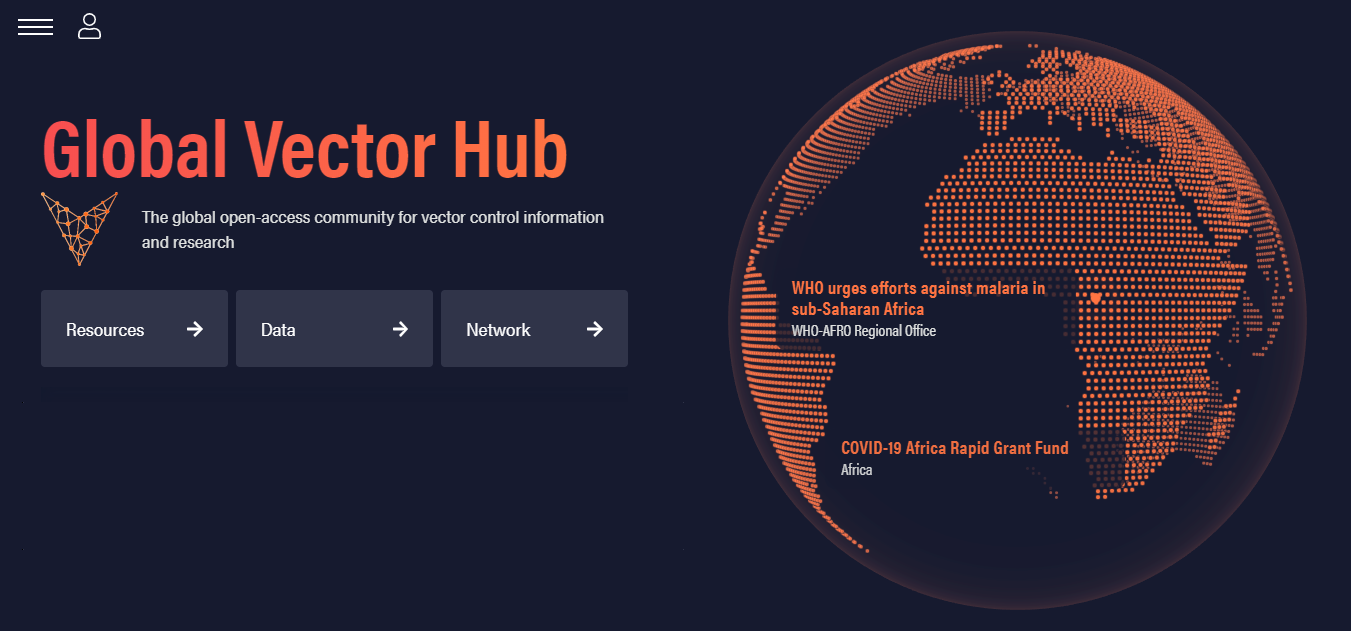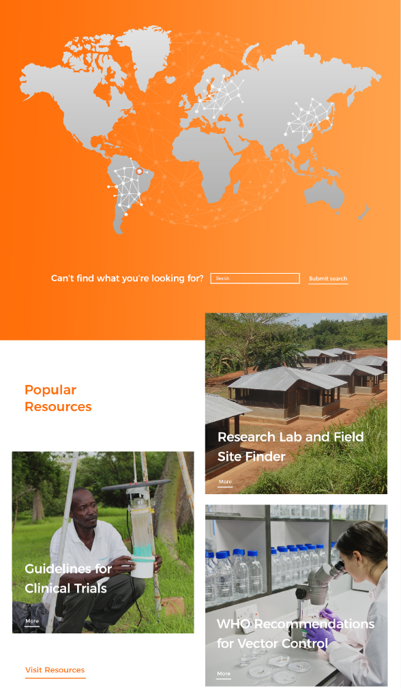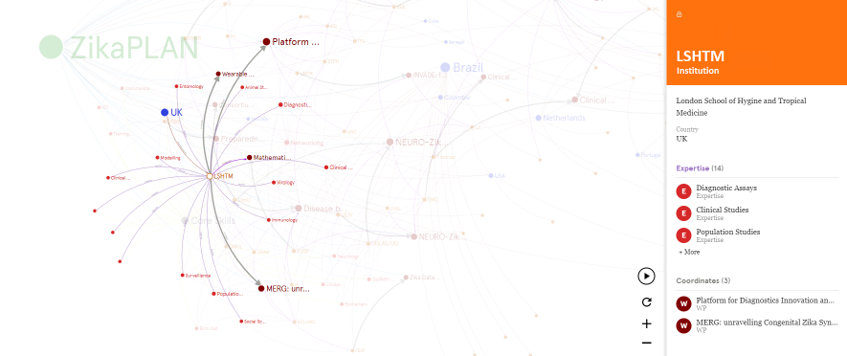More than half the world’s population is at risk of vector-borne diseases, yet no single, all-encompassing resource for researchers and health workers involved in vector-borne disease control exists. Until now.
The Global Vector Hub is a global first. It is an open access, interactive resource that not only has the capacity to transform vector research and vector control programmes, but revolutionise our preparedness and ability to respond quickly and effectively to vector-borne disease outbreaks, around the world.
For the first time, we aim to bring together researchers and health workers on the largest scale ever seen, cutting across several disciplines, diseases and vectors around the world. The movement towards this expansive and comprehensive approach to vector control cannot be achieved alone. We need you on board! The Global Vector Hub is designed for and owned by you – the vector community.
The Global Vector Hub aims to transform the way vector control and vector research communities operate and communicate, by providing a platform for sharing and disseminating data and information on vectors.
The Global Vector Hub aims to transform the way vector control and vector research communities operate and communicate, by providing a platform for sharing and disseminating data and information on vectors, through -
A database and integrated map
The Global Vector Hub includes a real-time, interactive disease and vector information function. This will take the form of a searchable database with an integrated map, giving the user current and relevant surveillance, control and research data and information about any country at the click of a button.
Research tools, guidelines and training packages
The Global Vector Hub is building capacity and establishing a solid community of practice. Users are able to download bespoke training packages, educational materials and research tools for laboratory and field research as well as operational control, specific to their vector of interest, geographic area and discipline.
Discussion forums
The Global Vector Hub will host and share user interactions, experiences and expertise. This will ensure that lessons are learned, gaps identified and impact is demonstrated and shared in every region.
Network of Networks
The Global Vector Hub connects the vector world on a scale never seen before. It hosts a searchable global registry of researchers, research labs and field sites with their research and control capacity, as well as information on academic, government, not-for-profit, industry led-organisations and research institutions. This will transform collaborations between individuals and groups with known vector related associations.
The Global Vector Hub will play a crucial role in the elimination of diseases that threaten the lives of more than half of the world’s population. It is fully aligned with the World Health Organization’s "Global Vector Control Response 2017-2030", which calls for the re-alignment of vector control programmes and a comprehensive approach to vector control, supported by increased technical capacity, strengthened monitoring systems and improved infrastructure. The Global Vector Hub will not only significantly facilitate the achievement of national health objectives, but also contribute towards the internationally recognised Sustainable Development Goals 1, 3, 10 and 16.
The Global Vector Hub is being led by Professor James Logan, with significant input from the Steering Committee members Dr Raman Velayudhan (WHO), Dr Seth Irish (CDC), Jeffrey Hii (PMI), Professor Mary Cameron (LSHTM), Professor Steve Lindsay (Durham University), and Dr Lucy Tusting (LSHTM).
The Global Vector Hub is managed by Dr Frederik Seelig (LSHTM), Dr Alex Hiscox (ARCTEC), Tanaka Nyoni (LSHTM), Grace Power (LSHTM) and Rohan Takhar (LSHTM). Dr Robert Jones (ARCTEC), Scott Tytheridge (ARCTEC), Chelci Squire (ARCTEC) and Dr Christopher Rice (ARCTEC) continue to provide specialist support throughout the development of the resource.
Meet the team
|
Dr James Logan - Principal Investigator Professor James Logan is the Principal Investigator for the Global Vector Hub at the London School of Hygiene and Tropical Medicine. James is the UK's leading expert on insect repellents and methods of personal protection against arthropod vectors. Whilst being a Professor of Medical Entomology in the Faculty of Infectious and Tropical Diseases he holds the positions of the Head of Department for the Department of Disease Control and the Director of the Arthropod Control Product Test Centre (ARCTEC).
|
|
|
Alexandra Hiscox - Head of Research Programmes Alex is an entomologist with a passion for the development and evaluation of new tools for the control of medically important arthropods. She obtained her BSc in Biological Sciences from the University of Oxford in 2005. Her project involved evaluating the fitness of transgenic Mediterranean fruit flies. Alex then studied at the London School of Hygiene and Tropical Medicine, where she completed an MSc in the Biology and Control of Disease Vectors (2007) and a PhD in Medical Entomology (2012), with support of the Institut Pasteur du Laos. Alex has a strong background in field and semi-field trials, and has worked in China, the Lao PDR, Vietnam, Kenya, Tanzania and Malawi. She has previously worked as a post-doctoral research scientist at Wageningen University and Research, where she led the first ever evaluation of mass-mosquito trapping for the purpose malaria control; a large-scale intervention study which took place on Rusinga Island, western Kenya. In 2019 Alex was appointed Head of Research Programmes with ARCTEC at the London School of Hygiene and Tropical Medicine. In this role, Alex has managed semi-field and large-scale field trials; building links between academia, industry and people living in disease-endemic countries. |
|
|
Dr Frederik Seelig – Partnerships Manager Dr Frederik Seelig is the Partnerships Manager for the Global Vector Hub. His main responsibilities include building and managing relationships with stakeholders across the vector control community, resource users, data providers and industry supporters. Before joining the London School of Hygiene & Tropical Medicine, Frederik worked in the Population Health team at the Wellcome Trust. He has a background in medical entomology, and his main interests include vector biology and ecology, Global Health, science writing and Open Access. |
|
|
Grace Power – Research Projects Manager and MEL Lead Grace is on the management team for the Global Vector Hub, leading the monitoring, evaluation and learning (MEL) activity for the resource. She is currently completing a part-time MSc in Public Health with a focus in health economics and epidemiology at the London School of Hygiene and Tropical Medicine. At the same time, she works in the Department of Disease Control, coordinating and managing rapid response and development projects, contributing to research on vector-borne disease risk factors and outcomes, and developing and writing proposals that support the implementation of tools and interventions in vector control. Grace's early academic background lies in anthropology and qualitative research and she has recently completed a diploma in life sciences for subjects allied to medicine. In addition, she has held a variety of roles in programme delivery, grant management, impact research, education, and communications, working across international development NGOs that focus on issues such as climate change, off-grid energy access, and human rights. Prior to working in international development, Grace trained as a TEFL Language Instructor and worked in Ha Noi, Vietnam and Madurai, India. |
|
|
Dr Robert Jones - Study Manager, Academic & International Development Lead Robert is Study Manager, Academic & International Development Lead at the Arthropod Control Product Test Centre (ARCTEC). Robert began his career at the University of Birmingham, with a BSc in Biological Sciences and MPhil (Res) in Molecular and Cellular Biology. He holds a PhD in Molecular Biology from the University of Bath, where he studied the molecular basis of insecticide resistance. He also has an MBA from Reims Management School with study abroad at the University of San Diego. Prior to joining ARCTEC, Robert was employed as a Postdoctoral Scientist at the University of Exeter and Muséum national d'Histoire naturelle, where he studied the genetics and evolution of wing patterning in butterflies, and annotated detoxification genes in the Heliconius genome. Robert is focused on vector-borne diseases and vector control, and he has a leading role with the Global Vector Hub, building a community of practice for researchers interested in vector control. |
|
|
Chelci Squires - Research Scientist Chelci is a Research Scientist and Trials Manager at the Arthropod Control Product Test Centre, working on international projects for both institutions and industry in the public health entomology sector. She is focused on design and implementation of MHRA, NICE, WHO, EPA and CDC approved protocols and training remote teams to conduct research studies to ICH GCP and GLP guidelines. Chelci has a background in biomedicine, clinical trials and molecular genetics and is currently working in the Faculty of Infectious Tropical Diseases, applied in the field of public health and clinical research to evaluate vector-borne diseases and vector control technologies. Chelci is currently leading the development of a Vector Control MOOC (Massive Open Online Course) which will be available to the public in summer 2019 and has co-developed the Global Vector Hub. |
|
|
Scott Tytheridge – Research Assistant Scott Tytheridge is the research assistant for the Global Vector Hub at the London School of Hygiene & Tropical Medicine. Scott has a BSc (Hons) in Zoology from the University of Reading. He also holds an MSc in Medical Entomology from the London School of Hygiene & Tropical Medicine, where he worked as part of a large project in the Bijagós archipelago, Guinea-Bissau. Scott has previous experience working in a diagnostic parasitology laboratory, supervising postgraduate students in malaria diagnostics, tissue pathology and sample preparations. Scott currently supports on gathering/processing data, writing content and website development for the Global Vector Hub. |
|
|
Dr Chris Rice - Business Development Manager Dr Chris Rice leads the business team at the Arthropod Control Product Test Centre (ARCTEC), based at the London School of Hygiene & Tropical Medicine. With experience in academic and commercial environments, Chris’s role is to build commercial relationships with industry and to develop funding opportunities for both ARCTEC and the Global Vector Hub. |
|
|
Tanaka Nyoni - Project Coordinator Tanaka Nyoni is a Project Coordinator at the London School of Hygiene and Tropical Medicine. He has a BSc (Hons) in Biomedical Science and an MSc in Medical Microbiology from Queen Mary University of London. With project management experience in both the public and private sectors. Tanaka supports the management team for the Global Vector Hub and is currently assisting with content management and website development. |







